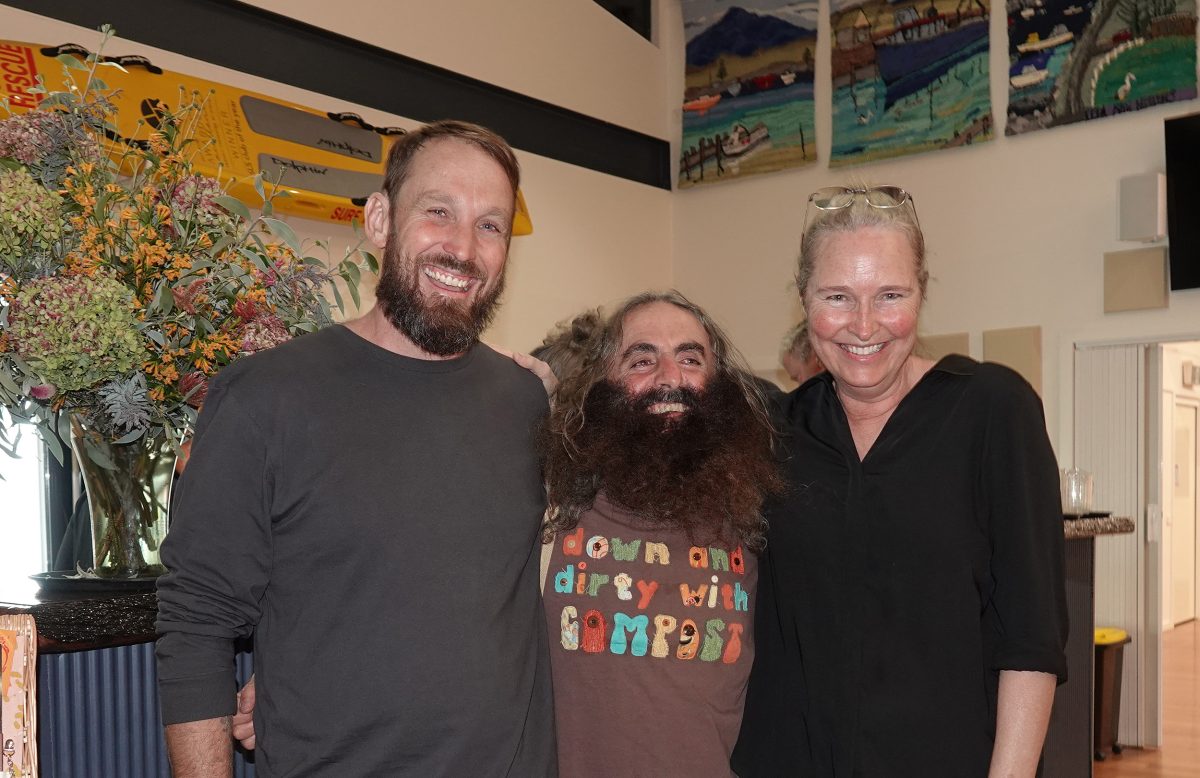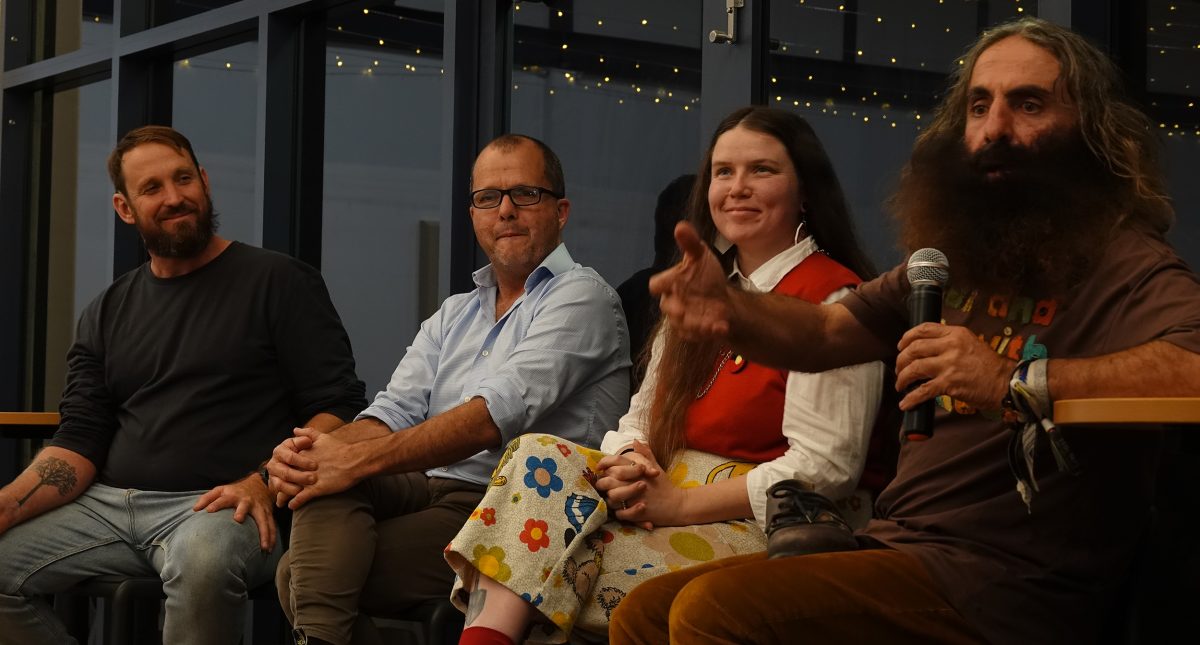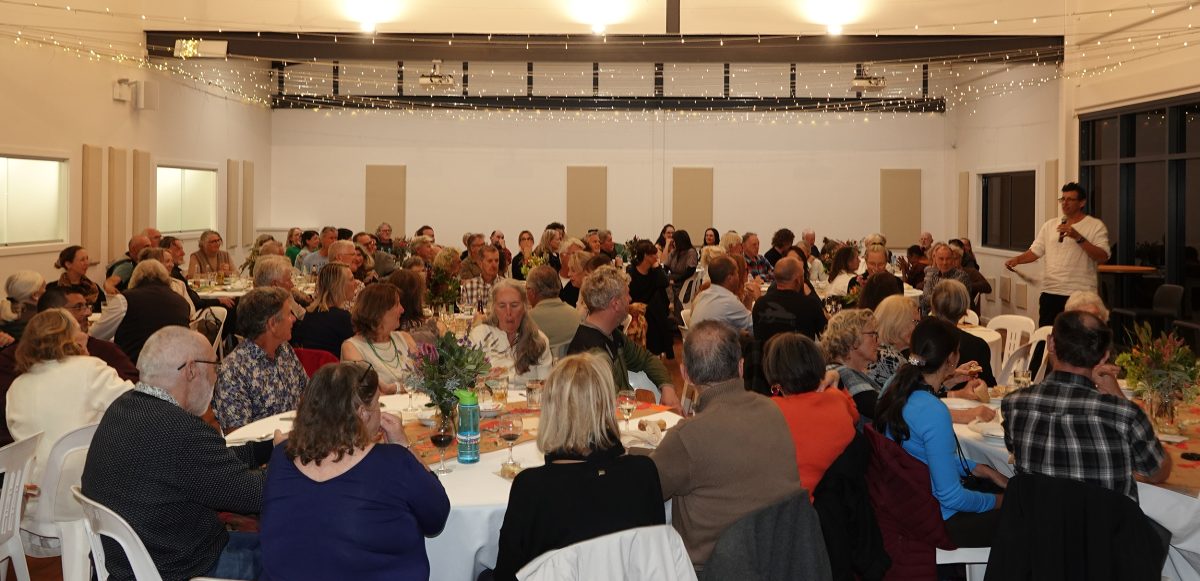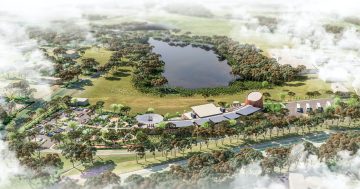
Paul West, Costa Georgiadis and Bermagui Preschool director and teacher Narelle Myers at the Moodji Futures Dinner on 9 May. Photo: Alison Kuiter.
The Moodji Futures Dinner was sold out as people from across the Bega Valley and Eurobodalla shires came to support the annual fundraiser for Bermagui Preschool’s Moodji Farm.
The urban and Indigenous agriculture project is now six years old and thriving, thanks to great community support plus the oversight of project manager Dan Bakker.
Bermagui’s Paul West, of River Cottage Australia fame, was a lively and entertaining MC at the dinner held at Bermagui Surf Life Saving Club on 9 May.
He moderated a panel discussion on the circular economy. The panellists were Costa Georgiadis of ABC’s Gardening Australia, Andrew Taylor of the Regional Circularity Cooperative in Bega, and Rhiannon Simmonds of Sunny Urban Farm. She is a Bermagui-based grower and beekeeper who hosts regular mending workshops for her CWA branch and runs seasonal clothing swaps from her home.
Before the discussion began, Costa and Mr West served miso pumpkin soup, followed by a farm to plate vegetable curry. Most of the produce came from Moodji Farm, along with some provided by Oz Harvest.

Paul West moderated a panel discussion with Andrew Taylor, Rhiannon Simmonds and Costa. Photo: Alison Kuiter.
Circularity is an ancient practice that reduces waste by keeping things running at their highest level for as long as possible. With the advent of globalisation and the industrial revolution, circularity has been largely replaced by the concepts of consumption and convenience.
Mr Taylor said modern life now revolved around consumption. “It is cheaper to buy a new pair of socks than to darn them,” he said.
In a circular economy, people think about the end of a product’s life from the outset. In France for example, goods have a repairability index.
Costa talked about repair cafes. They are not just places to take things to get fixed, but the people working there will encourage you to sit down and learn from them how to repair items.
“It isn’t just about the darning or fixing, but it is also the time spent together,” Costa said.
Ms Simmonds said circular economies always came down to the community. It is about wanting to spend money with people you know.
“The majority of the money stays in the community because they will spend it on someone else in the community,” she said. “That is the best way to spend money, making those decisions.”

Dan Bakker of Eat Dirt Permaculture, who convened Costa’s regional tour, addresses the Moodji Futures Dinner. Photo: Alison Kuiter.
Costa said too many people bought mass-produced, low-quality items.
“Because we are buying those things, we are giving people a licence to make rubbish that doesn’t last. This is blackmail of the resources that belong to us collectively,” Costa said. “We are the ones in charge. If we don’t buy your stuff, you are stuffed.”
Ms Simmonds said people could reduce the environmental footprint of those low-quality items by repairing them or sharing them. For example, she feels comfortable borrowing tools from the vast collection her neighbour has in his shed.
Costa, Mr Taylor and Ms Simmonds gave examples of circularity such as the Tool Library in Cobargo and the house in Brogo that was built using the Bega Valley Local Exchange Trading System. Goods and services are traded using a virtual currency called sapphires.
Costa spoke about the hyper-local compost group in Castlemaine. It is called YIMBY, meaning ‘Yes, in my backyard’. They wheel their scraps in a little cart to a designated site in their neighbourhood so no fuel is used. They have younger members, the GYMby team, who do the heavy physical work of turning the hot compost. The high-quality compost is used to grow food in their backyards.
It was Costa’s ninth annual trip to the Far South Coast to check out the great things being done at the community level and reconnect with the youngsters at Bermagui Preschool. Some of them keep coming to see him even though they have moved on to primary school.
“I get that feeling of connection. If I am present with them, I get so much back,” Costa said. “One child kept calling me compost. That will fuel me for the next 12 months.”








